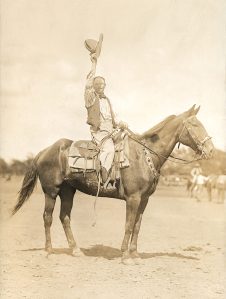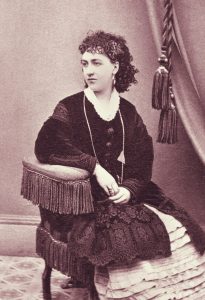RUTHERFORD B. HAYES: WARRIOR AND PRESIDENT
In the wake of the Northern victory in the Civil War, a nearly unbroken succession of bearded Republican war heroes entered the White House for the next three decades on the strength of their military service records. Beginning with Ulysses S. Grant in 1868, the Republican Party successfully elected six of the next eight presidents (a seventh, Chester A. Arthur, became president by accident, after the assassination of James A. Garfield in 1881). Only Grover Cleveland–who ironically had paid a substitute to serve for him during the war–managed to break the GOP’s postwar stranglehold on the nation’s affections.
The list of former Union officers winning election to the White House included Grant, Garfield, Rutherford B. Hayes, BenjaminHarrison and William McKinley. Except for Grant, whose remarkable military skills have guaranteed him a place in the national pantheon, the other Civil War veteran presidents have largely faded from view. Indeed, it would be hard to think of a more obscure president than Benjamin Harrison. American writer Thomas Wolfe spoke for many when he wrote in 1935: “Garfield, Arthur, Harrison and Hayes were the lost Americans: their gravely vacant and bewhiskered faces mixed, melted, swam together in the sea-depths of a past intangible, immeasurable and unknowable… which was which?”
Political obscurity is usually deserved. Grant, a great general, was a terrible president. Garfield, a much better politician, was assassinated at the very beginning of his term. Arthur, Garfield’s successor, was a longtime party hack who was more renowned for his entertaining skills than his politics. Harrison managed the always difficult task of losing his re-election bid to the very man–Cleveland–he had defeated in the first place. McKinley, also the victim of an assassin’s bullet, brought the country the Spanish-American War, which launched Theodore Roosevelt into the national spotlight. Only Rutherford B. Hayes, who assumed the presidency on the strength of a highly questionable “victory” over Democratic candidate Samuel Tilden, had both a military and political record worthy of remembrance. New York historian Ari Hoogenboom’s splendid new biography, Rutherford B. Hayes: Warrior and President (University Press of Kansas, Lawrence, Kan., 1995, $50), is a definitive act of recall.
Hayes came from Ohio, the cradle of an inordinate number of Civil War generals and postwar presidents. Grant, Garfield, Hayes and McKinley all came from Ohio (although Grant’s family moved across the border to Illinois when he was young); so did such Union Army stalwarts as William Tecumseh Sherman, Phil Sheridan, William Rosecrans, Don Carlos Buell, Alexander McCook and dozens of other high-ranking officers. Hayes’ Civil War career, although conducted at a regimental level, was highly creditable. As colonel of the 23rd Ohio Regiment, he served the entire four years of the war, seeing action in such bitter battles as Carnifex Ferry, South Mountain, Cloyd’s Mountain, Kernstown, Winchester, Fisher’s Hill and Cedar Creek. He was wounded five times, once severely, had four horses shot from under him, and emerged from the war with a brigadier’s star and a seat in Congress.
Hayes was a good soldier, but as Hoogenboom makes clear, he was an even better politician. Beginning with his election to Congress while he was still in the Army, Hayes never lost an electoral contest. His knack for winning close races–he was elected governor of Ohio three times by razor-thin margins–served him best when he ran for president in 1876 against Tilden, the popular and powerful governor of New York. On election night, Hayes went to bed convinced–as was most of the nation–that he had lost badly. (Tilden, in fact, had received a quarter of a million more popular votes.) But quick-thinking Republican political operatives, capitalizing on the bayonet-supported control of Southern states by Reconstruction-era regimes in South Carolina and Louisiana, immediately challenged election returns in those two states, as well as Florida and Oregon. What followed was a constitutional crisis unmatched in American history.
With both sides claiming victory and charging fraud, what Hoogenboom accurately describes as “a sordid struggle for electoral votes” began. Hayes, somewhat disingenuously, stayed above the fray while party stalwarts, including President Grant, worked behind the scenes to ensure that just enough Democratic votes would be disallowed in the contested states to give Hayes a highly questionable victory. An unprecedented Electoral Commission was then chosen to decide which returns to accept. (All four states sent two different sets of returns to Washington to be formally counted.) By a strictly partisan vote of 8?7, the commission selected the Hayes returns, and “His Fraudulency, Rutherfraud B. Hayes” became president.
Despite such unsavory beginnings–Tilden almost surely should have been certified president on the strength of Louisiana’s initially wide majority–Hayes proved to be a strong, reform-minded president. Hoogenboom gives Hayes high marks for initiating civil-service reform at a time when the abuses of the Grant administration had–shades of today–put the entire system of government into public disrepute. He also praises Hayes for reversing the trend toward congressional domination of government by taking his case directly to the American people through vigorous travel and frequent speeches. The notion that Hayes was a failed president, says Hoogenboom, rests mainly on Hayes’ disastrous pledge at the outset of his presidential campaign not to seek re-election: “Presidents who serve only one term are usually written off as mediocrities, while those acclaimed as great have invariably been re-elected.”
Having begun with a highly questionable mandate and a self-inflicted lame duck status, it is amazing that Hayes accomplished all he did. Hoogenboom attributes these successes to Hayes’ curious mixture of innate decency and political steeliness–not the worst attributes for an American president, particularly one whose choices, as his able biographer convincingly demonstrates, were severely limited by both the method of his election and the condition of the country at the time of his ascension. It is highly unlikely that Rutherford B. Hayes will get, or need, a better biography than the one Ari Hoogenboom has written for him.
Roy Morris, Jr.




